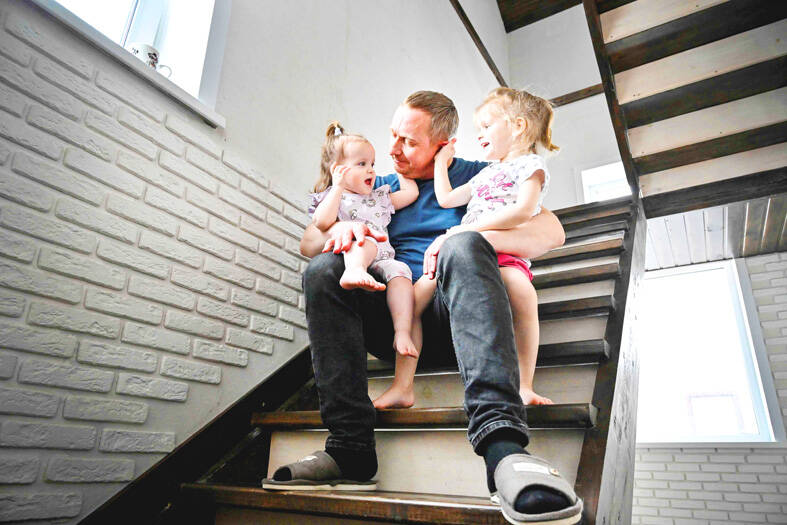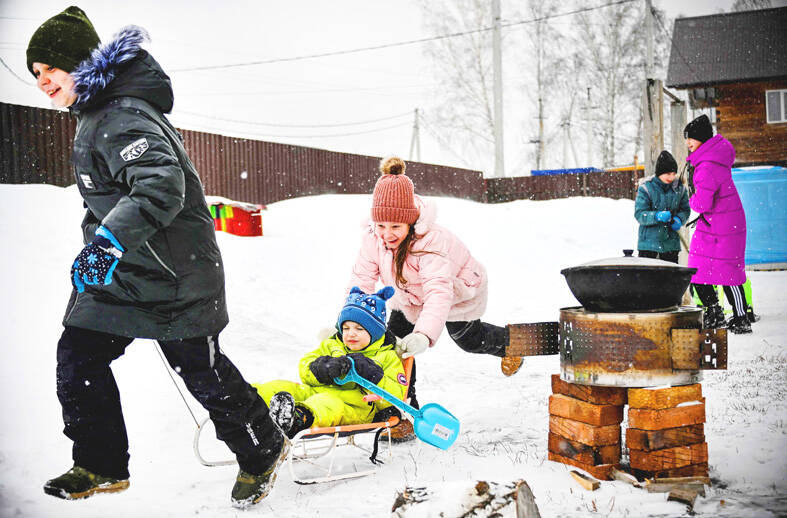At their home in the middle of Siberia, Russian pastor Roman Vinogradov and his wife, Yekaterina Vinogradova, are the new foster parents of five children from Moscow-occupied eastern Ukraine.
The Vinogradovs are experienced foster parents now raising 16 children, including four of their own, and say they just want to help those who are “very much in need.”
However, Ukraine and human rights groups have condemned the forced transfer of thousands of children into Russia or Moscow-controlled territory since the invasion started on Feb. 24 last year.

Photo: AFP
Ukrainian President Volodymyr Zelenskiy last week referred to “kidnapping, forced adoption and re-education of Ukrainian children committed by Russia,” calling it “a war crime and a crime against humanity.”
Russia says it is simply taking in “refugee” children from Ukraine.
“I didn’t steal anyone, and they [the children] don’t think they were stolen,” said Vinogradov, a 41-year-old Protestant minister.

Photo: AFP
The couple, who live in the Siberian city of Novosibirsk, more than 3,000km east of Moscow, said that local authorities asked them to take in Ukrainian children after they requested another child.
“They phoned from children’s services, saying: ‘Will you take children from Ukraine?” 38-year-old Vinogradova said.
“We said: ‘Yes, we’ll take them,’” she said. “What difference does it make? Children are children everywhere.”
The couple are now fostering five Ukrainian half-siblings — four girls and a boy aged three to 12, who arrived from Moscow six months ago. They already had seven foster children.
The husband and wife say the Ukrainian children came from children’s homes in the city of Lugansk, which has been controlled by Russian-backed separatists since 2014. They showed foster papers issued by officials from Lugansk’s pro-Moscow administration.
The children do not recall their mother, who was stripped of her parental rights, Vinogradov said.
“The time will come of course when they ask questions. We’ll have a look [for her]. Maybe we’ll organize a meeting,” Vinogradova said.
According to international law, no party to a conflict should evacuate children to a foreign country except temporarily for a compelling health or safety reason.
Ukrainian Residential Commissioner for Children’s Rights and Child Rehabilitation Daria Gerasymchuk said that Russia was refusing to recognize that these children were “deportees.”
“Russians hide our children,” she told journalists last week.
Kyiv has so far brought back 308 children, Gerasymchuk said, with a “big team of government officials working to this end.”
Ukraine has “many pieces of evidence coming from different cities,” and has identified 43 children’s camps in Russia, but children “are being moved around all the time,” she said. “We have evidence of how much effort was taken by Russia to make it impossible to reunify families.”
Volodymyr Sagaidak, the head of a children’s rehabilitation center outside the Ukrainian city of Kherson, said in January that during Russian occupation, officials questioned him on the children’s whereabouts and seized their files.
Oksana Koval, a 49-year-old teacher at the center, said that after the city was occupied, they quickly handed over most of the children, aged three to 17, to relatives. Staff took others home. Koval herself took three girls.
“The Russians didn’t know we had the children. We told them the children had been taken home by their parents,” she said. “We cared only about one thing — saving the children.”

Yemen’s separatist leader has vowed to keep working for an independent state in the country’s south, in his first social media post since he disappeared earlier this month after his group briefly seized swathes of territory. Aidarous al-Zubaidi’s United Arab Emirates (UAE)-backed Southern Transitional Council (STC) forces last month captured two Yemeni provinces in an offensive that was rolled back by Saudi strikes and Riyadh’s allied forces on the ground. Al-Zubaidi then disappeared after he failed to board a flight to Riyadh for talks earlier this month, with Saudi Arabia accusing him of fleeing to Abu Dhabi, while supporters insisted he was

‘SHOCK TACTIC’: The dismissal of Yang mirrors past cases such as Jang Song-thaek, Kim’s uncle, who was executed after being accused of plotting to overthrow his nephew North Korean leader Kim Jong-un has fired his vice premier, compared him to a goat and railed against “incompetent” officials, state media reported yesterday, in a rare and very public broadside against apparatchiks at the opening of a critical factory. Vice Premier Yang Sung-ho was sacked “on the spot,” the state-run Korean Central News Agency said, in a speech in which Kim attacked “irresponsible, rude and incompetent leading officials.” “Please, comrade vice premier, resign by yourself when you can do it on your own before it is too late,” Kim reportedly said. “He is ineligible for an important duty. Put simply, it was

‘TERRORIST ATTACK’: The convoy of Brigadier General Hamdi Shukri resulted in the ‘martyrdom of five of our armed forces,’ the Presidential Leadership Council said A blast targeting the convoy of a Saudi Arabian-backed armed group killed five in Yemen’s southern city of Aden and injured the commander of the government-allied unit, officials said on Wednesday. “The treacherous terrorist attack targeting the convoy of Brigadier General Hamdi Shukri, commander of the Second Giants Brigade, resulted in the martyrdom of five of our armed forces heroes and the injury of three others,” Yemen’s Saudi Arabia-backed Presidential Leadership Council said in a statement published by Yemeni news agency Saba. A security source told reporters that a car bomb on the side of the road in the Ja’awla area in

Syrian President Ahmed al-Sharaa on Sunday announced a deal with the chief of Kurdish-led forces that includes a ceasefire, after government troops advanced across Kurdish-held areas of the country’s north and east. Syrian Kurdish leader Mazloum Abdi said he had agreed to the deal to avoid a broader war. He made the decision after deadly clashes in the Syrian city of Raqa on Sunday between Kurdish-led forces and local fighters loyal to Damascus, and fighting this month between the Kurds and government forces. The agreement would also see the Kurdish administration and forces integrate into the state after months of stalled negotiations on